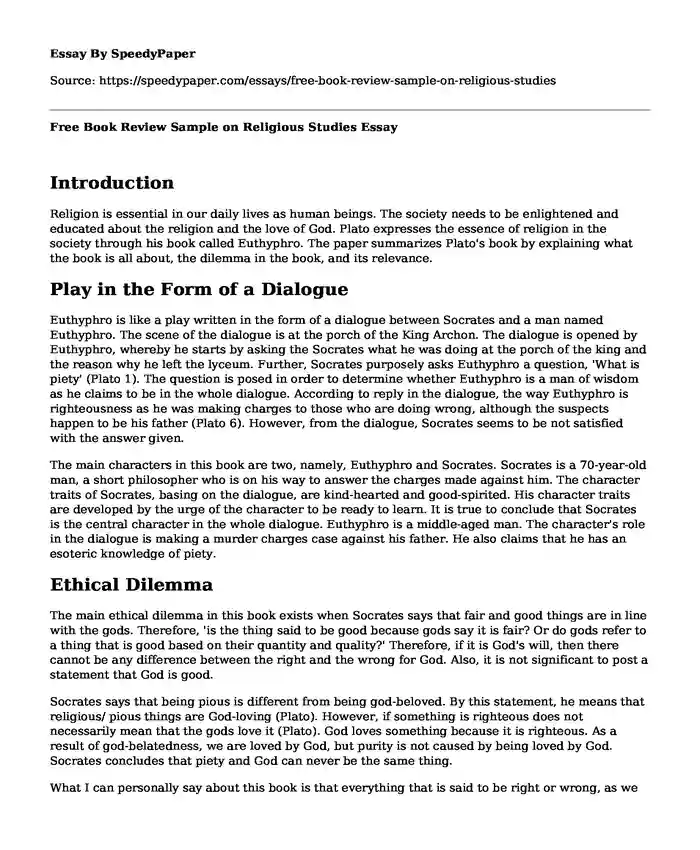
| Essay type: | Book review |
| Categories: | Literature Religion Ethical dilemma Plato |
| Pages: | 3 |
| Wordcount: | 674 words |
Introduction
Religion is essential in our daily lives as human beings. The society needs to be enlightened and educated about the religion and the love of God. Plato expresses the essence of religion in the society through his book called Euthyphro. The paper summarizes Plato's book by explaining what the book is all about, the dilemma in the book, and its relevance.
Play in the Form of a Dialogue
Euthyphro is like a play written in the form of a dialogue between Socrates and a man named Euthyphro. The scene of the dialogue is at the porch of the King Archon. The dialogue is opened by Euthyphro, whereby he starts by asking the Socrates what he was doing at the porch of the king and the reason why he left the lyceum. Further, Socrates purposely asks Euthyphro a question, 'What is piety' (Plato 1). The question is posed in order to determine whether Euthyphro is a man of wisdom as he claims to be in the whole dialogue. According to reply in the dialogue, the way Euthyphro is righteousness as he was making charges to those who are doing wrong, although the suspects happen to be his father (Plato 6). However, from the dialogue, Socrates seems to be not satisfied with the answer given.
The main characters in this book are two, namely, Euthyphro and Socrates. Socrates is a 70-year-old man, a short philosopher who is on his way to answer the charges made against him. The character traits of Socrates, basing on the dialogue, are kind-hearted and good-spirited. His character traits are developed by the urge of the character to be ready to learn. It is true to conclude that Socrates is the central character in the whole dialogue. Euthyphro is a middle-aged man. The character's role in the dialogue is making a murder charges case against his father. He also claims that he has an esoteric knowledge of piety.
Ethical Dilemma
The main ethical dilemma in this book exists when Socrates says that fair and good things are in line with the gods. Therefore, 'is the thing said to be good because gods say it is fair? Or do gods refer to a thing that is good based on their quantity and quality?' Therefore, if it is God's will, then there cannot be any difference between the right and the wrong for God. Also, it is not significant to post a statement that God is good.
Socrates says that being pious is different from being god-beloved. By this statement, he means that religious/ pious things are God-loving (Plato). However, if something is righteous does not necessarily mean that the gods love it (Plato). God loves something because it is righteous. As a result of god-belatedness, we are loved by God, but purity is not caused by being loved by God. Socrates concludes that piety and God can never be the same thing.
What I can personally say about this book is that everything that is said to be right or wrong, as we may think, can only be approved by God (Plato). God approves everything according to his will, and we, as human beings, should be ready to conform to His will. Moreover, from the Book, Socrates is good-hearted, which is one way of fulfilling God's will. The book is most relevant in modern society and metaphysics. I can say that the supreme God creates everything that is in the universe, and he is the one who approves anything. For instance, piety can be discussed in modern-day and society as being approved by God's approval. God also approves righteousness in our daily lives, so we realize his manifestation in our lives.
Conclusion
Euthyphro is one of the books that help us understand about religion. The main ethical dilemma from the book assists the reader in understanding the relevance of being good and fair as much as righteousness is concerned. Moreover, the book is of great relevance to society as one can get full knowledge concerning religion.
Work Cited
Plato. Euthyphro. Kessinger Publishing, 2004.
Cite this page
Free Book Review Sample on Religious Studies. (2023, Nov 24). Retrieved from https://speedypaper.com/essays/free-book-review-sample-on-religious-studies
Request Removal
If you are the original author of this essay and no longer wish to have it published on the SpeedyPaper website, please click below to request its removal:
- Essay Samples on Saint Paul John the Great
- Free Essay with a Rhetorical Analysis of the Article How to Defeat ISIS
- Elements toward Building an Argumentation Essay Example
- "The Pact" Book and Social Learning Theory, Free Essay for You
- Incidents in the Life of a Slave Girl - Literary Essay Example
- Essay Sample on The Dilemma of Jehovah's Witness Children Who Need Blood to Survive
- Business Dilemma Case Study
Popular categories




